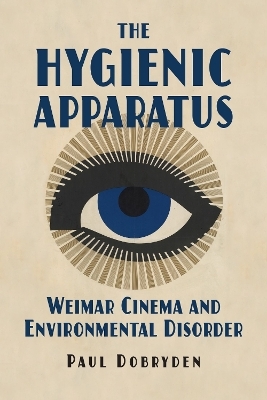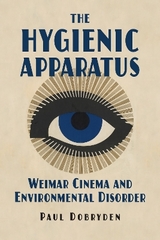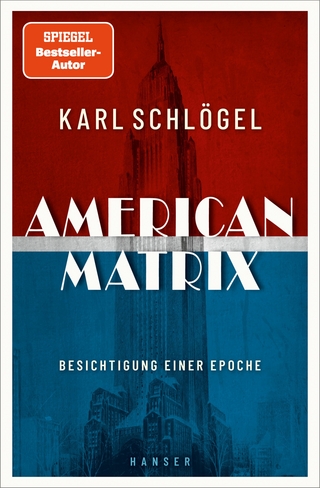The Hygienic Apparatus
Weimar Cinema and Environmental Disorder
Seiten
2022
Northwestern University Press (Verlag)
978-0-8101-4497-2 (ISBN)
Northwestern University Press (Verlag)
978-0-8101-4497-2 (ISBN)
Traces how the environmental effects of industrialization reverberated through the cinema of Germany's Weimar Republic. Framing hygiene within the project of national reconstruction, the book explores cinema's material contexts alongside its representations of housework, urban space, traffic, pollution, disability, aging, and labour.
This study traces how the environmental effects of industrialization reverberated through the cinema of Germany's Weimar Republic. In the early twentieth century, hygiene encompassed the myriad attempts to create healthy spaces for life and work amid the pollution, disease, accidents, and noise of industrial modernity. Examining classic films—including The Last Laugh, Faust, and Kuhle Wampe—as well as documentaries, cinema architecture, and studio practices, Paul Dobryden demonstrates how cinema envisioned and interrogated hygienic concerns about environmental disorder.
Framing hygiene within the project of national reconstruction after World War I, The Hygienic Apparatus explores cinema's material contexts alongside its representations of housework, urban space, traffic, pollution, disability, aging, and labor. Reformers worried about the health risks associated with moviegoing but later used film to popularize hygienic ideas, encouraging viewers to see the world and themselves in relation to public health objectives. Modernist architecture and design fashioned theaters into regenerative environments for fatigued spectators. Filmmakers like F. W. Murnau and Slatan Dudow, meanwhile, explored the aesthetic and political possibilities of dirt, contagion, intoxication, and disorder. Dobryden recovers a set of ecological and biopolitical concerns to show how the problem of environmental disorder fundamentally shaped cinema's relationship to modernity. As accessible as it is persuasive, the book adds to a growing body of scholarship on biopolitics within German studies and reveals fresh ways of understanding the apparatus of Weimar cinema.
This study traces how the environmental effects of industrialization reverberated through the cinema of Germany's Weimar Republic. In the early twentieth century, hygiene encompassed the myriad attempts to create healthy spaces for life and work amid the pollution, disease, accidents, and noise of industrial modernity. Examining classic films—including The Last Laugh, Faust, and Kuhle Wampe—as well as documentaries, cinema architecture, and studio practices, Paul Dobryden demonstrates how cinema envisioned and interrogated hygienic concerns about environmental disorder.
Framing hygiene within the project of national reconstruction after World War I, The Hygienic Apparatus explores cinema's material contexts alongside its representations of housework, urban space, traffic, pollution, disability, aging, and labor. Reformers worried about the health risks associated with moviegoing but later used film to popularize hygienic ideas, encouraging viewers to see the world and themselves in relation to public health objectives. Modernist architecture and design fashioned theaters into regenerative environments for fatigued spectators. Filmmakers like F. W. Murnau and Slatan Dudow, meanwhile, explored the aesthetic and political possibilities of dirt, contagion, intoxication, and disorder. Dobryden recovers a set of ecological and biopolitical concerns to show how the problem of environmental disorder fundamentally shaped cinema's relationship to modernity. As accessible as it is persuasive, the book adds to a growing body of scholarship on biopolitics within German studies and reveals fresh ways of understanding the apparatus of Weimar cinema.
Paul Dobryden is an assistant professor in the Department of Germanic Languages and Literatures at the University of Virginia.
Acknowledgments
Introduction: Hygiene, Cinema, and German Modernity
1. The Hygienic Dispositif: Health and the Movie Theater Environment
2. Hygienic Modernization: Visions of Environmental Order in the Weimar Kulturfilm
3. Matter Out of Place: Pollution and Distraction in F.W. Murnau's Faust
4. Bodies Out of Place: Images of Disability and Aging
5. Landscapes of Exploitation: Environmental Disorder and Late Weimar Oppositional Filmmaking
Afterword: Hygiene and Media, Then and Now
Filmography
Notes
Bibliography
Index
| Erscheinungsdatum | 29.04.2022 |
|---|---|
| Verlagsort | Evanston |
| Sprache | englisch |
| Maße | 152 x 229 mm |
| Gewicht | 633 g |
| Themenwelt | Kunst / Musik / Theater ► Film / TV |
| Geisteswissenschaften ► Geschichte ► Regional- / Ländergeschichte | |
| Geisteswissenschaften ► Sprach- / Literaturwissenschaft ► Anglistik / Amerikanistik | |
| Geisteswissenschaften ► Sprach- / Literaturwissenschaft ► Literaturwissenschaft | |
| Sozialwissenschaften ► Kommunikation / Medien ► Medienwissenschaft | |
| ISBN-10 | 0-8101-4497-2 / 0810144972 |
| ISBN-13 | 978-0-8101-4497-2 / 9780810144972 |
| Zustand | Neuware |
| Haben Sie eine Frage zum Produkt? |
Mehr entdecken
aus dem Bereich
aus dem Bereich
Erinnerungen
Buch | Softcover (2024)
Pantheon (Verlag)
16,00 €




